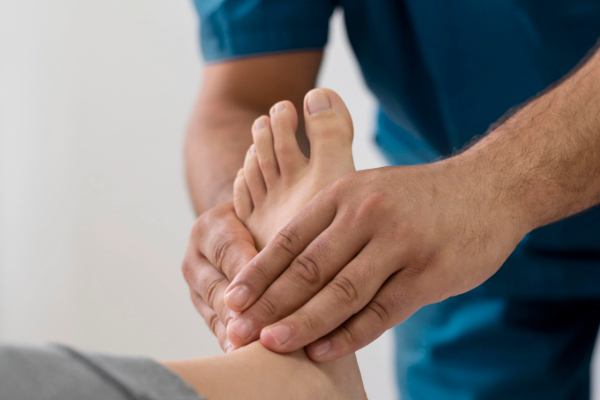Plantar Fasciitis: Why Heel Pain Hurts So Much - And Why Relief Can Feel Out of Reach



If you’ve ever taken your first step out of bed and felt a sharp, stabbing pain in your heel – like you’re stepping on a drawing pin – there’s a good chance you’re dealing with Plantar Fasciitis.
This very common condition affects people across all walks of life, and it’s something we see regularly here, at The Oving Clinic in Chichester. From busy parents and office workers to runners and people on their feet all day, Plantar fasciitis doesn't discriminate, though it's most commonly seen in people aged 40–60. That said, we’ve treated younger athletes and older adults alike.
What Causes Plantar Fasciitis?
Plantar fasciitis happens when the plantar fascia, the thick band of tissue that runs along the bottom of your foot, becomes irritated or inflamed. This can be due to repetitive strain, long hours on your feet or wearing unsupportive shoes.
Flat Feet and Plantar Fasciitis, What’s The Link?
Flat feet (or “dropped arches”) don’t always cause pain on their own, but they can put extra strain on the plantar fascia. That extra pressure increases your risk of developing plantar fasciitis, though not everyone with flat feet will get it, and not everyone with plantar fasciitis has flat feet.
Why Is the Pain So Intense?
You might be surprised by how severe the pain can feel. Patients often describe it as:
- A knife-like jab in the heel
- Feeling like they’re walking on glass
- A dull ache that builds throughout the day
For some, the pain comes and goes. For others, it’s constant and significantly affects their daily life. The worst part? It often strikes at the worst times – those first few steps in the morning or after periods of sitting.
Despite how common it is, relief from Plantar fasciitis can be frustratingly elusive. One of the most commonly recommended treatments is rest – but let’s be honest, complete rest simply isn’t realistic for most people in Chichester trying to manage work, family, and day-to-day life!
Who Gets It?
While anyone can develop Plantar fasciitis, it’s most common in adults between 40 and 60, especially those who:
- Stand or walk on hard surfaces for long periods (like nurses, teachers, or retail workers)
- Run or engage in high-impact sports
- Wear flat or unsupportive footwear
- Have flat feet, high arches, or tight calf muscles
- Are overweight or going through weight fluctuations
We also see many people who develop it after starting a new exercise routine or suddenly increasing their walking during a holiday or fitness kick.
What Can Help with Plantar Fasciitis?
At The Oving Medical Clinic in Chichester, we recommend a range of effective plantar fasciitis treatments, tailored to the cause and severity of your heel pain.
Home-based Stretching and Self-care
Gentle exercises can help reduce tension in the plantar fascia and calf muscles:
- Towel stretch
Sit with your leg straight, loop a towel around the ball of your foot and gently pull it toward you. - Calf stretches
Stand facing a wall, step one foot back and bend the front knee. Keep the back leg straight with your heel on the ground. - Rolling massage
Roll a cold drink can, frozen water bottle, or massage ball under your foot for a few minutes to release tightness.
Daily stretching, foot elevation, and applying ice packs can reduce inflammation — but for many people, especially those with chronic plantar fasciitis, these methods may not offer lasting relief.
Diagnostic Ultrasound Scanning for Heel Pain
We offer bedside diagnostic ultrasound right here in the clinic to assess the thickness and condition of your plantar fascia. This real-time scan allows us to accurately diagnose plantar fasciitis and rule out other causes of heel pain — without the need for outside referrals or delays.
Shockwave Therapy for Plantar Fasciitis in Chichester
That’s where Extracorporeal Shockwave Therapy (ESWT) can help. At The Oving Clinic, we offer this modern, non-invasive treatment for chronic Plantar Fasciitis. It works by sending targeted sound waves into the affected tissue, stimulating the body’s natural healing response, improving blood flow, and helping to break down scar tissue.
Many of our patients find that after just a few sessions of shockwave therapy, their pain significantly reduces – even when other treatments have failed.
Ultrasound-Guided Injection Therapy
When conservative care and shockwave therapy haven’t resolved the pain, we may recommend ultrasound-guided steroid or platelet-rich plasma (PRP) injections. These are administered under direct ultrasound guidance, ensuring precise delivery to the affected tissue. This approach increases both accuracy and safety, while maximising the chance of pain relief.
These advanced options are available right here in Chichester, giving you fast access to specialist plantar fasciitis treatments from our experienced musculoskeletal team.
Get Expert Help at The Oving Clinic
If you’re dealing with persistent heel pain, you don’t have to manage it alone. Dr Morgan and Dr Tanner are experienced in diagnosing and treating Plantar Fasciitis and other foot and musculoskeletal issues for patients in Chichester and the surrounding Coastal and South Downs regions.
We know how hard it is to keep up with daily life when every step hurts. That’s why we offer a complete treatment approach combining advice, hands-on care, and advanced therapies like shockwave treatment tailored to your needs.
Book Online Today
Don’t let heel pain drag on for months – no one should have to live in pain! If you're in Chichester or the surrounding area and think you may have Plantar fasciitis, get in touch today.
Book your appointment by clicking here and let Dr Morgan and Dr Tanner help you get back on your feet – pain-free.
